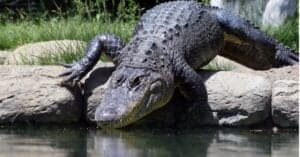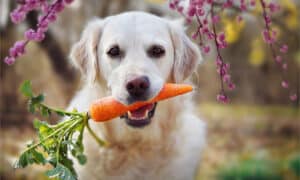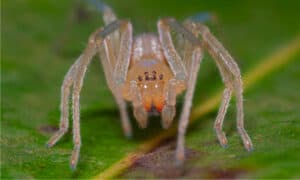Koalas to “Vax Up” Against Chlamydia
After years of struggling to find an end to the chlamydia epidemic that has had sweeping negative effects on Australia’s koala populations, researchers think they have found a solution.
The Australia Zoo Wildlife Hospital in Queensland — also home to the Irwin family — will roll out a new chlamydia specifically created to treat koalas. This vaccine trial will include 400 koalas and will be the largest test of the vaccine yet. Researchers are hoping that this vaccine will help keep koalas off the endangered species list and protect their species.
Koalas were already a threatened population before the 2020 Australian fire season. Car strikes, dog attacks, land clearing, and other environmental struggles were already negatively impacting koala populations in Australia. After the destruction and death caused by the 2020 bushfires, threatened species experts confirmed that koala were on the road to extinction. Unless more efforts were made to protect this species, we were going to lose them. The chlamydia vaccine is one such effort.
Currently, chlamydia is running rampant in koala populations. Long term effects of this sexually transmitted disease cause infertility and blindness in koalas. In addition, the disease causes an immense amount of pain for koalas when urinating. A vaccine will help decrease these effects in koalas and improve both their long term survival and their quality of life.
Why Do Koalas Need To “Vax Up”?
Currently half of the koala populations in Queensland are affected by chlamydia. This means that as these animals reproduce and breed, they will pass the disease both sexually between mates and from mother to child. Without a vaccine, the disease will continue its rampage through the populations.
Previously tested in smaller groups of 250 koalas, the chlamydia vaccine is safe and has no negative effects on the animals. Unlike humans, koalas cannot be treated for chlamydia with antibiotics. Not only is it more difficult to continue an antibiotic regimen with wild koalas, but the medicine affects the gut bacteria koalas need to digest eucalyptus leaves. The single jab vaccine solves both of these issues. Koalas can receive the vaccine when passing through Australia’s wildlife hospitals and can return to the wild without supervision and be able to eat their natural food source.
The vaccine will treat current koala infections and will also hopefully prevent future transmissions. Though known to treat current infections, it is still unknown whether this vaccine will prevent the transmission of chlamydia’s dormant bacteria. This trial will hopefully clear up this question as it is the first time vaccinated koalas will return to the wild. In previous trials, the vaccinated koalas were all living in captivity.
If successful, this vaccine will roll out to other wildlife hospitals and be introduced to other wild koala populations across Australia. In order to track the vaccine’s success, each koala in the Australia Zoo Wildlife Hospital will be tagged and tracked after its return to the wild. By tracking vaccinated koalas, researchers will be able to see the differences in lifestyle quality between the vaccinated and unvaccinated.
This vaccine may be the change we need to protect the koalas. Hopefully as koalas “vax up”, the transmission and infection rates of chlamydia will decrease, ultimately changing the trajectory of koalas’ futures.
More from A-Z Animals
After years of struggling to find an end to the chlamydia epidemic that has had sweeping negative effects on Australia’s koala populations, researchers think they have found a solution.
The Australia Zoo Wildlife Hospital in Queensland — also home to the Irwin family — will roll out a new chlamydia specifically created to treat koalas. This vaccine trial will include 400 koalas and will be the largest test of the vaccine yet. Researchers are hoping that this vaccine will help keep koalas off the endangered species list and protect their species.
Koalas were already a threatened population before the 2020 Australian fire season. Car strikes, dog attacks, land clearing, and other environmental struggles were already negatively impacting koala populations in Australia. After the destruction and death caused by the 2020 bushfires, threatened species experts confirmed that koala were on the road to extinction. Unless more efforts were made to protect this species, we were going to lose them. The chlamydia vaccine is one such effort.
Currently, chlamydia is running rampant in koala populations. Long term effects of this sexually transmitted disease cause infertility and blindness in koalas. In addition, the disease causes an immense amount of pain for koalas when urinating. A vaccine will help decrease these effects in koalas and improve both their long term survival and their quality of life.
Why Do Koalas Need To “Vax Up”?
Currently half of the koala populations in Queensland are affected by chlamydia. This means that as these animals reproduce and breed, they will pass the disease both sexually between mates and from mother to child. Without a vaccine, the disease will continue its rampage through the populations.
Previously tested in smaller groups of 250 koalas, the chlamydia vaccine is safe and has no negative effects on the animals. Unlike humans, koalas cannot be treated for chlamydia with antibiotics. Not only is it more difficult to continue an antibiotic regimen with wild koalas, but the medicine affects the gut bacteria koalas need to digest eucalyptus leaves. The single jab vaccine solves both of these issues. Koalas can receive the vaccine when passing through Australia’s wildlife hospitals and can return to the wild without supervision and be able to eat their natural food source.
The vaccine will treat current koala infections and will also hopefully prevent future transmissions. Though known to treat current infections, it is still unknown whether this vaccine will prevent the transmission of chlamydia’s dormant bacteria. This trial will hopefully clear up this question as it is the first time vaccinated koalas will return to the wild. In previous trials, the vaccinated koalas were all living in captivity.
If successful, this vaccine will roll out to other wildlife hospitals and be introduced to other wild koala populations across Australia. In order to track the vaccine’s success, each koala in the Australia Zoo Wildlife Hospital will be tagged and tracked after its return to the wild. By tracking vaccinated koalas, researchers will be able to see the differences in lifestyle quality between the vaccinated and unvaccinated.
This vaccine may be the change we need to protect the koalas. Hopefully as koalas “vax up”, the transmission and infection rates of chlamydia will decrease, ultimately changing the trajectory of koalas’ futures.






